
Sparidae is a family of ray-finned fishes belonging to the order Spariformes, the seabreams and porgies, although they were traditionally classified in the order Perciformes. They are found in shallow temperate and tropical waters around the world and are demersal carnivores.
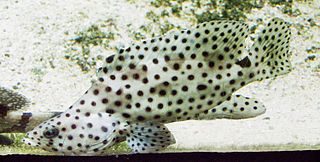
Serranidae is a large family of fishes belonging to the order Perciformes. The family contains about 450 species in 65 genera, including the sea basses and the groupers. Although many species are small, in some cases less than 10 cm (3.9 in), the giant grouper is one of the largest bony fishes in the world, growing to 2.7 m in length and 400 kg (880 lb) in weight. Representatives of this group live in tropical and subtropical seas worldwide.
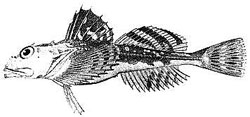
A sculpin is a type of fish that belongs to the superfamily Cottoidea in the order Perciformes. As of 2006, this superfamily contains 7 families, 94 genera, and 387 species.

The Scorpaeniformes are a diverse order of ray-finned fish, including the lionfishes and sculpins, but have also been called the Scleroparei. It is one of the five largest orders of bony fishes by number of species, with over 1,320.

The Cottidae are a family of fish in the superfamily Cottoidea, the sculpins. It is the largest sculpin family, with about 275 species in 70 genera. They are referred to simply as cottids to avoid confusion with sculpins of other families.
The wolf herrings are a family (Chirocentridae) of two marine species of ray-finned fish related to the herrings.
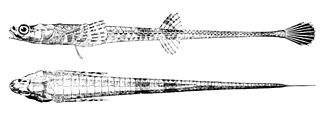
Agonidae is a family of small, bottom-dwelling, cold-water marine fish. Common names for members of this family include poachers, Irish lords, sea ravens, alligatorfishes, starsnouts, hooknoses, and rockheads. They are notable for having elongated bodies covered by scales modified into bony plates, and for using their large pectoral fins to move in short bursts. The family includes about 59 species in some 25 genera, some of which are quite widespread.
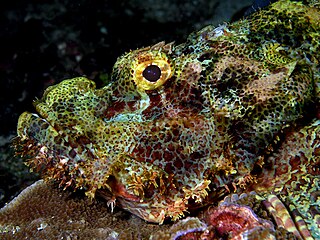
The Scorpaenidae are a family of mostly marine fish that includes many of the world's most venomous species. As their name suggests, scorpionfish have a type of "sting" in the form of sharp spines coated with venomous mucus. The family is a large one, with hundreds of members. They are widespread in tropical and temperate seas but mostly found in the Indo-Pacific. They should not be confused with the cabezones, of the genus Scorpaenichthys, which belong to a separate, though related, family, Cottidae.

Ostraciidae or Ostraciontidae is a family of squared, bony fish belonging to the order Tetraodontiformes, closely related to the pufferfishes and filefishes. Fish in the family are known variously as boxfishes, cofferfishes, cowfishes and trunkfishes. It contains about 23 extant species in 6 extant genera.
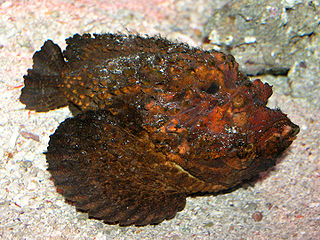
Synanceiinae is a subfamily of venomous ray-finned fishes, waspfishes, which is classified as part of the family Scorpaenidae, the scorpionfishes and their relatives. These fishes are found in the Indo-Pacific oceans. They are primarily marine, though some species are known to live in fresh or brackish waters. The various species of this family are known informally as stonefish, stinger, stingfish and ghouls. Its species are known to have the most potent neurotoxins of all the fish venoms, secreted from glands at the base of their needle-like dorsal fin spines. The vernacular name, stonefish, for some of these fishes derives from their behaviour of camouflaging as rocks. The type species of the family is the reef stonefish.

Scorpaenoidei is a suborder of ray-finned fishes, part of the order Perciformes, that includes the scorpionfishes, lionfishes and velvetfishes. This suborder is at its most diverse in the Pacific and Indian Oceans but is also found in the Atlantic Ocean.
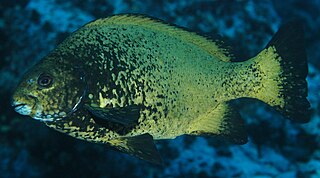
The sea chubs, also known as rudderfish and pilot fish and in Hawaiian as enenue or nenue, are a family, Kyphosidae, of fishes in the order Perciformes native to the Atlantic, Indian and Pacific Oceans usually close to shore in marine waters.

Tetraroginae is a subfamily of marine ray-finned fishes, commonly known as waspfishes or sailback scorpionfishes, belonging to the family Scorpaenidae, the scorpionfishes and their relatives. These fishes are native to the Indian Ocean and the West Pacific. As their name suggests, waspfishes are often venomous; having poison glands on their spines. They are bottom-dwelling fish, living at depths to 300 metres (980 ft). These creatures usually live in hiding places on the sea bottom.

Platycephaloidei is a suborder of ray-finned fishes, part of the order Scorpaeniformes, and includes the flatheads, ghost flatheads and sea robins.

Cottoidei is a suborder of ray-finned fishes which, according to the 5th edition of Fishes of the World, is placed within the order Scorpaeniformes, alongside the scorpionfishes, flatheads, eelpouts, sticklebacks and related fishes.

Synbranchinae is a subfamily of swamp eel, consisting of six of the ten genera in the family Synbranchidae. The remaining genus, the monotypic Macrotrema is the only one in the other subfamily Macrotreminae. The subfamily occurs in the Neotropics, Afrotropics and Asia.

Epinephelini is one of the five tribes in the subfamily Epinephelinae, the groupers, which is part of the family Serranidae which also includes the anthias and the sea basses.

Scorpaeninae is a subfamily of ray-finned fish belonging to the family Scorpaenidae in the order Scorpaeniformes, it includes the scorpionfishes, the lionfishes and turkeyfishes. They bear venomous spines in the anal, dorsal and pelvic fins which can cause severe pain in envenomated humans. The subfamily is distributed in the tropical and temperate seas around the world.

Chirolophinae is a subfamily of marine ray-finned fishes, classified within the family Stichaeidae, the pricklebacks or shannies. These fishes are found in the North Pacific, Arctic and North Atlantic Oceans.

Cottinae is a subfamily of ray-finned fishes belonging to the family Cottidae, the typical sculpins. The subfamily has species throughout the northern hemisphere in both marine and freshwater habitats.



















